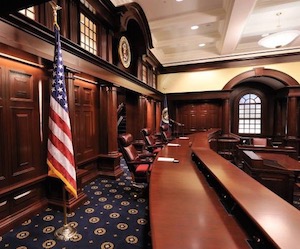 Last month, the United States Court of Appeals for the Federal Circuit issued a decision in Ethicon Endo-Surgery, Inv. V. Covidien LP, an appeal from the United States Patent and Trademark Office (USPTO), Patent Trial and Appeal Board (PTAB). The dispute arose as the result of a Covidien inter partes review (IPR) petition challenging claims of U.S. Patent No. 8,317,070 (“the ’070 patent”), which is owned by Ethicon. The PTAB granted the petition and the IPR proceeded to a decision on the merits. On the merits, the same panel that determined that the petition should proceed in the first place, found all challenged claims invalid as obvious over the prior art.
Last month, the United States Court of Appeals for the Federal Circuit issued a decision in Ethicon Endo-Surgery, Inv. V. Covidien LP, an appeal from the United States Patent and Trademark Office (USPTO), Patent Trial and Appeal Board (PTAB). The dispute arose as the result of a Covidien inter partes review (IPR) petition challenging claims of U.S. Patent No. 8,317,070 (“the ’070 patent”), which is owned by Ethicon. The PTAB granted the petition and the IPR proceeded to a decision on the merits. On the merits, the same panel that determined that the petition should proceed in the first place, found all challenged claims invalid as obvious over the prior art.
Ethicon appealed to the Federal Circuit, arguing that the PTAB’s final decision was invalid because the same Board panel made both the decision to institute and the final decision. Ethicon also argued that the Board erred in finding the claims obvious.
The Federal Circuit, in an opinion by Judge Dyk who was joined by Judge Taranto, first held that 35 U.S.C. § 314(d), which says that decisions to institute cannot be appealed, did not preclude the Court from hearing Ethicon’s challenge to the authority of the Board to render a final decision. On the merits, the panel held that neither the statute nor the Constitution precludes the same panel of the PTAB that made the decision to institute inter partes review from making the final determination. The Federal Circuit also found no error in the Board’s determination that the ’070 patent claims would have been obvious over the prior art. Judge Newman dissented.
On the institution decision, the Federal Circuit ruled that Section 314(d) does not prevent the court from considering the question raised by Ethicon. Ethicon did not challenge the institution decision per se, but rather challenged whether a defect in the final decision was created as the result of the institution decision being made by the same panel as decided the merits. The Federal Circuit concluded that Section 314(d) “does not prevent us from hearing a challenge to the authority of the Board to issue a final decision.”
Thus, it would appear that the substance of an initiation decision cannot be appealed, but subject matter jurisdiction may be appealed.
On the issue of whether the same panel can reach institution decisions and still decide the case on the merits, the Federal Circuit relied on the Supreme Court’s decision in Withrow v. Larkin, 421 U.S. 35 (1975). In Withrow, the question was whether a physician’s due process rights had been violated by a state medical board’s suspension of his license when the same board both investigated, and then later adjudicated, the issue. The Supreme Court held that there was no due process violation, finding that combining the investigative and adjudicatory functions in a single body does not raise constitutional concerns.
The Federal Circuit also went on to say that PTAB judges are owed a presumption of honesty and integrity, and to support a challenge, actual bias must be demonstrated.
In dissent, Judge Newman did not agree with Judges Dyk and Reyna that the statute is silent on the issue of separating initiation and merits decisions. To the contrary, she thinks the statute is rather clear and specific and requires delineation of the duties because the statute vests institution decisions in the Director, not the PTAB. Judge Newman concluded by saying that in order to restore confidence in the reliability of patents as “investment incentives” the USPTO must conform the inter partes review process to the statute.
Tags: CAFC, Federal Circuit, Inter Partes Review, IPR, judge dyk, Judge Newman, Judge Reyna, patent, patents




You share in the PLI Practice Center community, so we just ask that you keep things civil. Leave out the personal attacks. Do not use profanity, ethnic or racial slurs, or take shots at anyone's sexual orientation or religion. If you can't be nice, we reserve the right to remove your material and ban users who violate our Terms of Service.